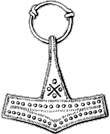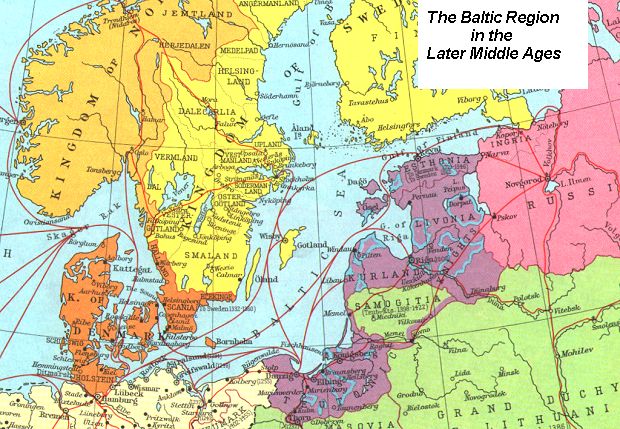Department of Scandinavian Studies
University of Washington
History of Scandinavia to 1720
(SCAND 380/HSTEU 380)
Fall Quarter, 2016
Time: MTWTh 1:30 pm - 2:20 pm
Room: Denny 256
(I&S)
(5 credits)
Professor: Dr. Terje Leiren
Office: 305U Raitt Hall
Telephone: (206)543-7233
E-mail: leiren at uw.edu
Office hours: Monday 10:00 - 11:00 am,
and by
appointment
Course Overview
This is a lecture/discussion course on Scandinavian history from the
end of the Viking Age to 1720. Covering such a long period of time,
the course will present an overview of the period. However, major
themes and events do emerge and we will focus on these from time to time.
Class time will be devoted, primarily, to lectures and discussions of
the lectures and reading material.
 The Viking Age has traditionally been presented as a violent and
chaotic period in the European middle ages. Vikings have generally
been depicted as "pagans" and "barbarians" seeking to destroy
Christian culture and society. While this may have a measure of
truth in it, it is far from the whole story. In fact, Viking
society is the principle foundation on which later society is built.
The nations of Denmark, Iceland, Norway, and Sweden emerge politically
and economically during the Viking Age. With the conversion of
Scandinavia to Christianity, the North finally joined Europe culturally,
but developments throughout Scandinavia were probably more influenced by
the pre-Christian culture than that which the Christian church and its
allies were instituting, at least for several generation.
The Viking Age has traditionally been presented as a violent and
chaotic period in the European middle ages. Vikings have generally
been depicted as "pagans" and "barbarians" seeking to destroy
Christian culture and society. While this may have a measure of
truth in it, it is far from the whole story. In fact, Viking
society is the principle foundation on which later society is built.
The nations of Denmark, Iceland, Norway, and Sweden emerge politically
and economically during the Viking Age. With the conversion of
Scandinavia to Christianity, the North finally joined Europe culturally,
but developments throughout Scandinavia were probably more influenced by
the pre-Christian culture than that which the Christian church and its
allies were instituting, at least for several generation.
As in the rest of Europe, Scandinavia saw the rise of individual
nation states in the early middle ages (ie. after the Christian
conversion) and these states were gradually integrated into broader
European culture. Although the Scandinavian middle ages did not
reach the artistic heights of England or France, for example, it
did develop a separate identity and significant level of sophistication.
King Haakon IV Haakonsson was a major medieval monarch in the 13th
century. The Icelandic Saga tradition which reached its height in
the 13th century developed a literature unique in the world.
Scandinavia also played a pivotal role in European commerce with
contacts between the European continuent and the Arctic, largely
facilitated by the Hanseatic League.
The early 16th century ushered in the Lutheran Reformation, a
revolutionary new way of looking at the world --the temporal and
the spiritual. In its wake, political conflicts led to the breakup
of the Kalmar Union and the emergence of an independent and growing
world power in Sweden. The 16th and 17th centuries saw the struggle
for supremacy in the Baltic between Denmark and Sweden, with continuing
interest in developments by England, France, the Netherlands, Russia,
Poland, and the German states. During these conflicts, the political
philosophy of "absolutism" reached its highest form of articulation
in Scandinavia with the Danish lex regia. It defined the
constitutional role of an absolute monarch and helped formulate the
parallel development of economic, and political, mercantilism.
The year 1720 essentially marks the beginning of the decline of
Sweden as a major European power, and a new direction for Scandinavian
political and cultural development.
Required Reading
- Peter and Birgitte Sawyer, Medieval Scandinavia
- Byron Nordstrom, History of Scandinavia since 1500
- Additional in-class handouts.
Exams
There will be two exams in this class
The exams will consist of an identification section and a short-essay
section.
Weekly Schedule of Topics/Lectures
A. Medieval Period:
- Week 1: Introduction: The Viking Background
- Week 2: From Odin to Christ: A New Religion and Changed Culture
- Week 3: Rise of National Monarchies
- Week 4: Divisions of Power: Monarchy, Clergy, Aristocracy
- Week 5: The Kalmar Union and the Swedish War of "National
Liberation"
First Examination (November 2, tentative)
B. Early Modern Period:
- Week 6: The Lutheran Reformation in Scandinavia
- Week 7: The Rise of the Vasa Dynasty
- Week 8: The struggle for Supremacy in the Baltic
- Week 9: Royal Absolutism - Danish and Swedish varieties
- Week 10: The Great Northern War. Review
Second Examination: Dec 12, 2:30-4:00 pm.

Copyright © 2011-16 Department of Scandinavian Studies, University of Washington, Seattle, WA
98195-3420
 The Viking Age has traditionally been presented as a violent and
chaotic period in the European middle ages. Vikings have generally
been depicted as "pagans" and "barbarians" seeking to destroy
Christian culture and society. While this may have a measure of
truth in it, it is far from the whole story. In fact, Viking
society is the principle foundation on which later society is built.
The nations of Denmark, Iceland, Norway, and Sweden emerge politically
and economically during the Viking Age. With the conversion of
Scandinavia to Christianity, the North finally joined Europe culturally,
but developments throughout Scandinavia were probably more influenced by
the pre-Christian culture than that which the Christian church and its
allies were instituting, at least for several generation.
The Viking Age has traditionally been presented as a violent and
chaotic period in the European middle ages. Vikings have generally
been depicted as "pagans" and "barbarians" seeking to destroy
Christian culture and society. While this may have a measure of
truth in it, it is far from the whole story. In fact, Viking
society is the principle foundation on which later society is built.
The nations of Denmark, Iceland, Norway, and Sweden emerge politically
and economically during the Viking Age. With the conversion of
Scandinavia to Christianity, the North finally joined Europe culturally,
but developments throughout Scandinavia were probably more influenced by
the pre-Christian culture than that which the Christian church and its
allies were instituting, at least for several generation.